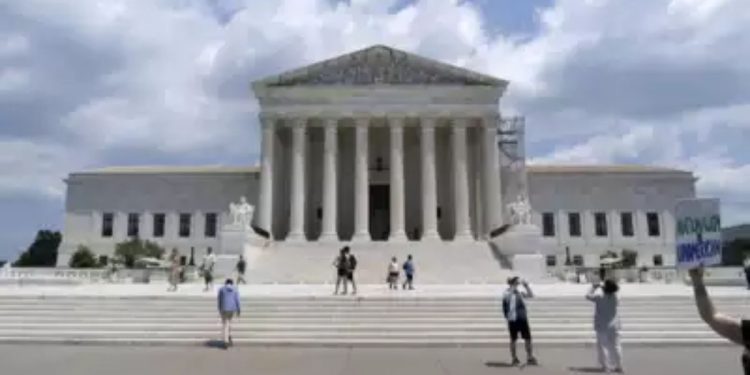On Friday, the Supreme Court made it more challenging to convict defendants in the Capitol riots of obstruction, a charge that former President Donald Trump also faced.
The court concluded 6-3 that the charge of impeding an official action, adopted in 2002 in response to the financial crisis that brought down Enron Corp., must include evidence that the defendants attempted to tamper with or destroy records. Only a few of the people who forcefully invaded the Capitol on January 6, 2021, fit into that category.
Trump and his Republican allies may use the decision to bolster their claims that the Justice Department treated the Capitol riot defendants unfairly.
It is unclear how the court’s judgment will influence the Trump case in Washington, while special counsel Jack Smith has stated that the former president’s accusations will remain unaffected.
The high court remanded the case of Joseph Fischer, a former Pennsylvania police officer, to a lower court to investigate the possibility of filing an obstruction charge against him. Congress indicted Fischer for interfering with the certification of Democrat Joe Biden’s 2020 presidential election victory over Trump.
Fischer is among approximately 350 people accused of obstruction. Some entered guilty pleas or received convictions on lesser charges.
Conservative Justices Samuel Alito, Neil Gorsuch, Brett Kavanaugh, and Clarence Thomas, as well as leftist Justice Ketanji Brown Jackson, joined Chief Justice John Roberts in writing the opinion.
Reading the obstruction provision liberally “would also criminalize a broad swath of prosaic conduct, exposing activists and lobbyists to decades in prison,” Roberts wrote.
Justices Elena Kagan, Sonia Sotomayor, and Amy Coney Barrett all dissented.
Barrett, one of three judges chosen by Trump, ruled that the law clearly covers the events of January 6. “The riot forced Congress to suspend the proceeding, delaying it for several hours,” according to her.
She asserted that the majority of her colleagues engaged in “textual backflips” in an attempt to limit the scope of the obstruction statute.
Attorney General Merrick Garland expressed disappointment with the judgment, saying it “limits an important federal statute.” Still, Garland stated that the cases against the “vast majority” of those involved in the attack will be unaffected.
“January 6 was an unprecedented attack on the cornerstone of our system of government—tthe peaceful transfer of power from one administration to the next,” he told reporters. “We will continue to use all available tools to hold accountable those criminally responsible for the January 6 attack on our democracy.”
Trump took to his Truth Social platform quickly after the judgment, calling it “big news!” He also published a statement describing the verdict as a “massive victory” for “J6 political prisoners.”
The leaders of two far-right extremist groups, the Proud Boys and the Oath Keepers, are among the approximately 170 Capitol insurrection defendants found guilty of blocking or conspiring to obstruct the joint session of Congress on January 6. The justices’ ruling on the case has postponed the sentencing of a number of defendants.
Concerns that they might serve more time than necessary if the Supreme Court decided against the Justice Department led to the early release of some rioters from prison during the appeal process. They include Kevin Seefried, a Delaware resident who threatened a black police officer with a pole attached to a Confederate battle flag while storming the Capitol. Last year, a judge sentenced Seefried to three years in prison, but ordered his release one year later while awaiting the Supreme Court’s decision.
Most lower-court judges who have weighed in have let the charges stand. U.S. District Judge Dabney Friedrich, a Trump appointee, stated that “statutes often reach beyond the principal evil that animated them.”
However, U.S. District Judge Carl Nichols, another Trump appointee, dismissed the charges against Fischer and two other defendants, stating that prosecutors went too far. A divided panel of the federal appeals court in Washington reinstated the charge before the Supreme Court decided to hear the case.
The Capitol incident has resulted in federal charges against more than 1,400 people. A jury or judge found approximately 1,000 of them guilty after a trial.
The United States Attorney’s Office in Washington, which handled the Jan. 6 prosecutions, stated that no one who has been convicted or charged with obstruction will be totally freed as a result of the verdict. Prosecutors added that each defendant is also facing further felony or misdemeanor counts, or both.
Prosecutors charged only obstruction as a felony offense against around 50 convicted individuals. The verdict will most certainly affect the nearly two dozen people who are still serving their sentences.










